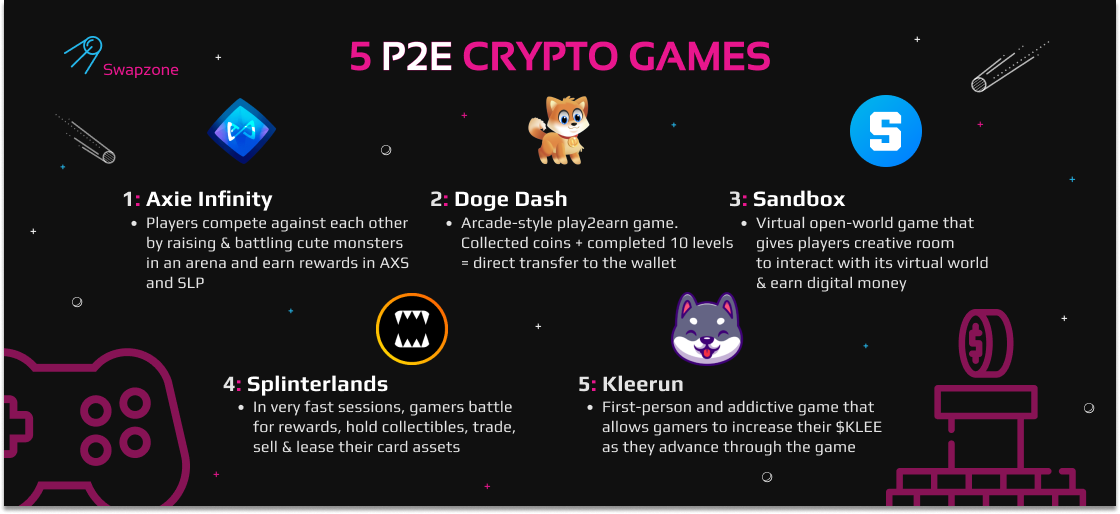How Play-to-Earn Incentives Are Transforming the Gaming Experience
This change welcomes gamers to spend not only their time however additionally their economic resources, promoting a sense of possession and much deeper involvement within video game communities. What implications could this have for the market and its gamers?
Evolution of Gaming Designs
The landscape of pc gaming has undergone a considerable makeover over the years, developing from standard pay-to-play versions to more ingenious frameworks that focus on customer involvement and money making. Games were largely marketed as standalone items, calling for ahead of time payments for access. This model, while effective in generating income, commonly restricted gamer interaction and neighborhood building.

In recent times, the increase of blockchain innovation has presented play-to-earn systems that fundamentally modify gaming dynamics. These models not just supply a platform for players to make benefits but additionally equalize the gaming economy, permitting individuals to own in-game properties. This advancement shows a broader fad towards community-driven experiences, where developers and gamers collaborate in shaping the gaming landscape, ultimately redefining just how value is viewed in the gaming sector.
Benefits of Play-to-Earn Equipments
Unlocking brand-new avenues for player interaction, play-to-earn systems supply a series of benefits that basically improve the video gaming experience. These systems encourage gamers by providing substantial benefits for their time and effort, cultivating a feeling of possession and financial investment in the video game. This inherent motivation drives players to engage even more deeply, discovering video game technicians and areas that they could or else overlook.
Furthermore, play-to-earn designs equalize gaming by leveling the playing field. Players from various backgrounds can profit from their abilities and creativity, enabling new entrants to experience financial benefits that were generally reserved for designers and publishers. This shift encourages a much more varied gamer base, enriching the pc gaming ecosystem with diverse point of views and experiences.
In addition, play-to-earn systems promote area building, as players team up and contend within decentralized settings. This communication cultivates social links that boost pleasure and retention, as gamers feel a sense of belonging.
Last but not least, these systems can bring about enhanced longevity for games, as continual gamer engagement commonly converts right into sustained rate of interest and financial investment in future models or developments, ensuring a lively pc gaming landscape.
Economic Influence on Players
Play-to-earn systems not only boost player interaction however additionally have considerable financial effects for people entailed. These systems enable players to monetize their time and skills, transforming gaming from a recreation right into a viable income source. As players earn copyright or in-game possessions that can be traded or marketed in real-world markets, they obtain economic motivations that can substantially impact their personal economic situations.
The financial model promotes a new age of entrepreneurship, as players can buy various video gaming ecological communities or create techniques to optimize their incomes. This possibility for revenue generation brings in a varied discover here group, consisting of those in regions with limited job possibilities - play to earn rewards. As a result, several gamers are now viewing video gaming not just as entertainment however as a pathway to financial empowerment.
Nevertheless, it see here is important to acknowledge the volatility related to cryptocurrencies and the possibility for market changes to influence profits. Gamers need to navigate these risks while balancing their pc gaming and economic tasks. Generally, the economic impact on players is extensive, improving their relationship with gaming and opening up methods for wealth development in an increasingly electronic economic climate.
Area Structure in P2E Games

Players in P2E environments frequently develop guilds or alliances, creating networks that promote source sharing, strategic preparation, and shared support. These groups commonly take part in participating missions or competitions, additionally reinforcing their bonds and boosting the overall pc gaming experience. In addition, community-driven events, such as tournaments and celebrations, serve to join players, foster sociability, and incentivize involvement.
Moreover, designers actively involve with their neighborhoods, incorporating comments and recommendations that form video game advancement. This joint strategy not only encourages players but also makes sure that video games advance abreast with gamer interests, boosting fulfillment and long-term involvement. Inevitably, area structure in P2E video games is not just a feature; it is a fundamental aspect that transforms the video gaming landscape into an extra comprehensive and interactive setting.
Future Trends in Video Gaming
The video gaming market's development is positioned to embrace numerous transformative fads that will certainly redefine player involvement and experience. One of the most substantial fads is the integration of synthetic intelligence (AI) to produce even more tailored pc gaming settings. AI can evaluate gamer behavior and choices, allowing programmers to tailor experiences that resonate deeply with specific customers.
In addition, the arrival of virtual and increased truth (VR/AR) innovations is established to boost immersion, providing players the capability to communicate with digital worlds in extraordinary means. This will not just boost gameplay however also foster social connections, as gamers can work together and compete in common settings.
Furthermore, the rise of blockchain innovation will proceed to influence the gaming landscape, allowing real ownership of in-game assets through non-fungible tokens (NFTs) This fad will certainly equip players to trade and monetize their pc gaming experiences, further blurring the lines in between pc gaming and investment.
Conclusion
In conclusion, the development of play-to-earn rewards indicates a pivotal transformation within the pc gaming industry. By incorporating financial incentives into gameplay, players are significantly engaged, promoting a sense of possession and investment in digital atmospheres. In addition, the democratization of video gaming facilitates diverse participation, advertising cooperation and read review area building. As these fads remain to evolve, the obscured lines in between enjoyment and financial investment will likely redefine the future of video gaming, shaping new experiences for gamers worldwide.